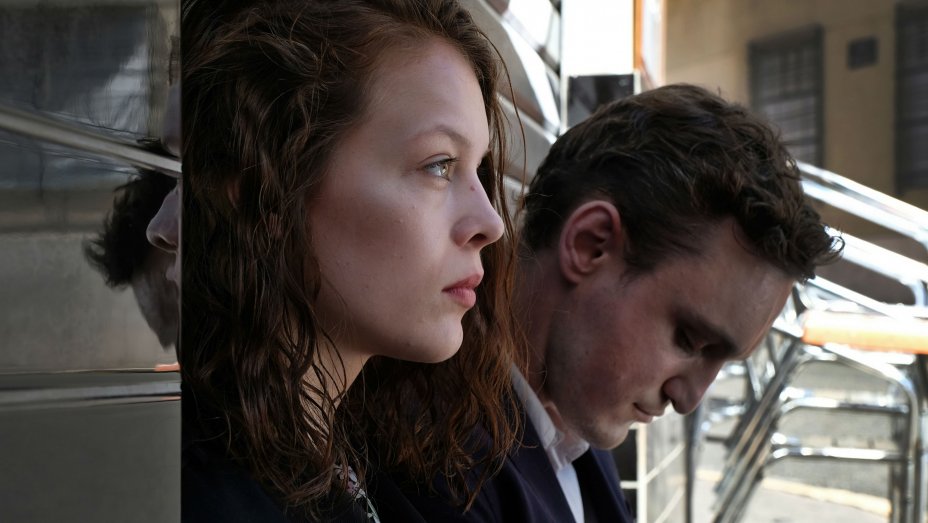The ostensible freedom of Marseille is quickly revealed to be no freedom at all. The storm troopers are still storming, just under a different banner as they roust and corral the transient masses flooding an overcrowded city. Amidst it all, Georg is relatively safe, able to snow an ambassador into believing his assumed story and booked onto a departing ship in several days. With nothing to do in the meantime, he befriends some of the city’s desperate inhabitants, including a mother and her young son and the inhabitants of a local pizzeria. To his great inconvenience, the wife of the dead writer, Marie (Paula Beer), keeps tapping him on the shoulder in the street, as he’s always around whenever she gets word that her husband has been spotted in the city. These instances of mistaken identity transform into a fraught relationship borne out of an instinctual need, as one character says, to tell someone their story in case they don’t make it out.
In comparing the two cities in different states of duress, Paris is shown to be awful and despairing, but the glimmer of hope present in Marseille makes things feel worse. Ships full of relieved expats, which here take the form of cruise liners, regularly leave the harbor, and if they can avoid the mines, they’re free. The people of Marseille can therefore imagine themselves on that boat, even if they know it’ll take a bureaucratic miracle to board it. Since he’s impersonating a writer, Georg needs to sound literate, so he tells a parable to an ambassador about a man who goes down to hell and waits for the gates to open. They never do, and the man is eventually told he’s been in hell the whole time. The anticipation of further punishment coupled with those boats creeping out of frame trap the city’s residents in constant mental torment.
The storm troopers are happy to contribute torment of the physical variety. Marseilles is cast with actors of Middle Eastern and North African descent as well as Europeans, and the darker-skinned inhabitants are often on the receiving end of the storm troopers’ wrath. Characters disappear from the film on multiple occasions, with no way for George to find out what happened to them. It’s possible they somehow made it out, or more likely, they were scooped up on a raid not unlike one captured in a harrowing scene. As an apartment is emptied out of the family living inside, they are ripped from each other while their neighbors can do nothing but stare at their feet and at each other, whatever it takes to not look at the victims. The stakes for each of them, including Georg, have become so elevated that they are unable to push back, as that would mean the immediate end of any chances of escaping the country. Instead, there’s only the shame of the moment as everyone slinks back into their rooms.
As the world of the film narrows, the relationship between Georg and Marie takes up more space. This is Petzold’s bread and butter, a romantic attraction that is tremendously difficult and certain to fail but must be indulged anyway. Georg can only tell Marie so much, and his guilt prompts him to make promises that he doubts he has any chance of keeping. Marie, unaware of her husband’s death, sees this man as a potential escape, though she wants to wait for a husband that’s never coming for as long as she can. For both of them, their safety is weighed against, for him, unwitting cruelty, and, for her, a promise to a husband she thinks is stuck inside enemy territory, and they simply can’t walk away without coming to some kind of resolution, a thing that the aforementioned disappearances imply will not be coming in this particular film. Based on the scrunched, uncomfortable faces on the other cast members and the extras, Petzold suggests that Georg and Marie’s ethical quagmires are only two in a city full of them, where no choice is right and every decision carries some level of recrimination.
With his heady examinations of totalitarian states and rebuilding broken lives, Petzold could be forgiven if the story took primacy of place over the characters, but his films have consistently contained great performances. Transit doesn’t quite have an all-timer like Nina Hoss’ work in Phoenix, but Rogowski is something special, believably inhabiting the many faces someone must put on and take off in an environment as fraught as this one. Vitally, Georg is given opportunities for warmth and tenderness amidst all the lies and duplicity, and Rogowski makes Georg into just as good a father figure as he is an improviser. He also wears the stress of the film’s events in his eyes and his posture, with the former getting blanker and blanker and the latter bearing increased psychic weight.
Petzold’s aesthetic choices, particularly the choice to make the film look timeless, isn’t a subtle decision but these aren’t subtle times. Several European countries seem to exist a handful of steps away from creating a world not unlike the one captured here, where the disappeared are dragged from their homes and dumped somewhere across the Mediterranean. The US President campaigned on exactly that vision. It’s all so conceivable that it nears the realm of the probable. Under the guise of a WWII film, Petzold invites the viewer to consider totalitarian life but from a position of comfort, where the immediate danger has passed but one still has to live near people for whom that is very much not the case. Petzold ends his film with David Byrne’s Road to Nowhere, a choice that doesn’t match the bleak tone but puts an absurdist spin on what’s just happened. What could be more absurd than dooming a person because they lack a stamp on a piece of paper? A-

 RSS Feed
RSS Feed